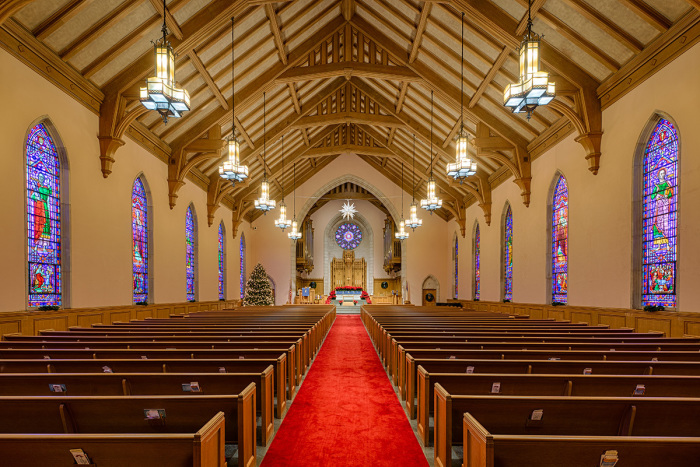
Pentecost Sunday is a special day on the Christian liturgical calendar that marks the anniversary of when the Holy Spirit descended upon the early church, as documented in Acts 2:1-13. The Christian Post spoke with Evangelical clergy about the significance of celebrating the event during worship services for Pentecost Sunday.
The Holy Spirit coming down to the Apostles led them to speak in diverse languages while tongues of fire were said to be above them, according to the biblical account.
Known as “the birthday of the Church,” Pentecost takes place 50 days after Easter, and, like Easter, it doesn’t have a fixed date on the calendar. This year, it falls on June 8.
Many churches that adhere to more traditional worship practices will celebrate the occasion with special elements, such as wearing red and confirming new members.
However, some churches from less liturgically-centered denominations, including non-denominational Evangelical congregations, tend not to hold a special worship service or events for Pentecost.
In a 2011 interview with The Christian Post, Michigan Evangelical Pastor Ron Benson said that “most free-wheeling Evangelicals don’t follow the church calendar at all, except for Christmas and Easter.”
Benson also believed that many non-denominational churches that don’t celebrate Pentecost refuse to do so because of a discomfort associated with charismatic worship.
“Ironically, a second reason we don’t pay much attention to Pentecost Sunday is that we’re afraid of the edgy displays of Holy Ghost-ism,” Benson explained at the time.
“It’s sad, but the more outrageous expressions of Pentecostalism and Charismatics make a celebration of Pentecost a little risky.”
However, some non-denominational congregations do make an effort to at least acknowledge the significance of the biblical event that Pentecost celebrates.
Matty Hupp, associate pastor at Life City Church Pickerington, Ohio, told CP that while his congregation may not do anything overtly special for Pentecost, they don’t ignore it, either.
“On Pentecost Sunday, we typically preach from Acts 2, where the Holy Spirit empowered the believers, and they began to witness in power,” he explained.
“If Acts 2 isn’t the main passage we preach from on Pentecost, then it is most definitely referenced as a supporting scripture for the passage that is being preached from.”
Hupp told CP that while “we don’t put the same planning efforts and advertising campaign into Pentecost that we put into Christmas or Easter, this isn’t to minimize the importance of what happened to the Church on Pentecost.”
Theologically speaking, Life City Church leans toward Pentecostal and Renewal Theology, according to Hupp, so the congregation focuses every Sunday on three things: “the life of Jesus,” “the cross and resurrection,” and “the power of the Holy Spirit at work in and through the believer.”
“We may not celebrate in a ‘major special way’ on Pentecost Sunday, but that’s because we celebrate Pentecost Sunday in how we live daily,” he continued. “If we only celebrate Pentecost (or Christmas and Easter, for that matter) as a memorial on a Sunday once a year but miss the significance of what that historical event actually means in the life of the believer and the hope for the world — then we’ve terribly missed the mark.”
While believing that “churches can acknowledge Pentecost Sunday each year if they want,” Hupp said he felt that it was “of the utmost importance that churches and believers would live a life based on what God did on Good Friday, Resurrection Sunday and Pentecost Sunday.”
“In other words, it’s good to celebrate Pentecost, but it’s absolutely essential to live a life of Holy Spirit empowerment,” he added.
By contrast, Galen Carey, vice president of government relations for the National Association of Evangelicals, belongs to a congregation affiliated with the Anglican Church in North America.
ACNA was originally formed in 2009 by congregations seeking to leave The Episcopal Church in response to that denomination’s increased theological liberalism, and maintains a higher church style of worship and hierarchy.
As a result, Carey told CP his church “has special prayers, hymns and readings on Pentecost Sunday.” The observance “also frames the worship and witness of the church over the next six months.”
“Like Christmas and Easter, Pentecost Sunday marks a foundational event in church history: the coming of the Holy Spirit, as described in Acts 2,” said Carey. “Church traditions vary in how Pentecost is remembered.”
“What is important is not the mode of celebration, but that churches are helping their members to live Spirit-filled lives that manifest both the gifts and the fruit that the Holy Spirit brings. In the power of the Spirit, the church demonstrates and proclaims the Good News of Jesus Christ.”
Carey also told CP that he believed “many Evangelical churches are recovering an appreciation for the rhythms of the Church calendar, and so are giving more thought to how Pentecost is celebrated.”
“Of course, for the many Evangelical churches in the Pentecostal tradition, every Sunday is a celebration of Pentecost and the ministry of the Holy Spirit,” he added.





